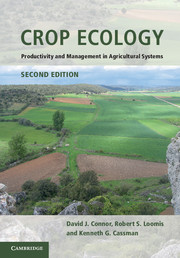Book contents
- Frontmatter
- Contents
- Preface
- Part I Farming systems and their biological components
- 1 Agricultural systems
- 2 Trophic chains
- 3 Community concepts
- 4 Genetic resources
- 5 Development
- Part II Physical and chemical environments
- Part III Production processes
- Part IV Resource management
- Part V Farming past, present, and future
- Species list
- Conversions and constants useful in crop ecology
- References
- Index
4 - Genetic resources
Published online by Cambridge University Press: 05 June 2012
- Frontmatter
- Contents
- Preface
- Part I Farming systems and their biological components
- 1 Agricultural systems
- 2 Trophic chains
- 3 Community concepts
- 4 Genetic resources
- 5 Development
- Part II Physical and chemical environments
- Part III Production processes
- Part IV Resource management
- Part V Farming past, present, and future
- Species list
- Conversions and constants useful in crop ecology
- References
- Index
Summary
Crop plants carry information acquired during their evolution and breeding that determines their performance in agricultural fields. That information is held in the genetic material of living plants and is subject to change through mutation and through recombination into new patterns, and can be lost. Proper management of this resource involves knowing the capabilities of germplasms, maintaining and improving their genetic constitution, and employing them advantageously in farming.
The terminology relating to genetic resources is in a state of flux. Here we use germplasm to denote the totality of genes and genetic combinations found in a species, or a major portion of it. A genetic population (sometimes “line” or “strain”) describes a smaller group of individuals (plants or seed) that share common ancestry and genes, and thus common traits. This use of the term population differs from that of population ecologists, who use it to denote closely related individuals that cohabit in time and space.
Genetic diversity in agriculture
Genetic diversity in farming can be defined at several levels. Here we deal with diversity of species and cultivars.
Species diversity
Thousands of plant species have been cultivated at some time or place, and several hundred are currently employed as crops, yet most crop production is derived from only a small number. Data presented in Table 4.1 account for most global production from arable land and permanent crops.
- Type
- Chapter
- Information
- Crop EcologyProductivity and Management in Agricultural Systems, pp. 71 - 95Publisher: Cambridge University PressPrint publication year: 2011
- 1
- Cited by



